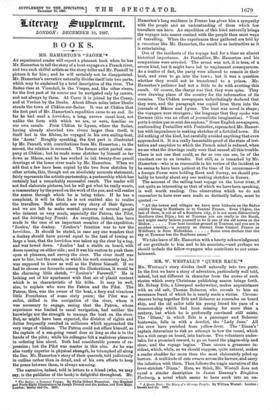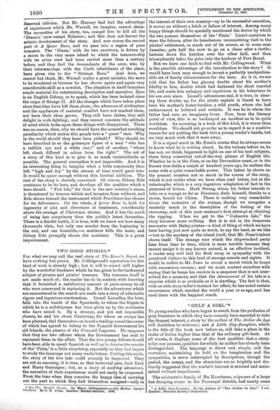MR. W. WESTALL'S "QUEER RACE."* Ma. WESTALL'S story divides itself
naturally into two parts. In the first we have a story of adventure, particularly well told, indeed, but not different in character from the scores of such stories which every Christmas publishing season brings forth. Mr. Sidney Erie, a Liverpool underwriter, makes acquaintance with an old salt, Thomas Bolsover, who reveals to him an insurance fraud of which he is nearly made a victim. Circum- stances bring together Erie and Bolsover as comrades on board ship, and the old sailor tells his young friend his yarn of a treasure-ship which had been missing for more than a century, but which he is profoundly convinced still exists. The 'Diana,' in which Erle is a passenger and Bolsover boatswain, falls in with a derelict, the 'Lady Jane.' All the crew have perished from yellow-fever. The 'Diana's' captain determines to risk an attempt to tow the vessel, which has a rich cargo on board, into harbour. Two volunteers under- take, for a promised reward, to go on board the plague-ship and steer, and the voyage begins. Then occurs a gruesome in- cident, which, while, as we should suppose, quite natural, makes a reader shudder far more than the most elaborately piled-up horrors. A multitude of rats swarm across the hawser, and carry the infection with them. Then follows the tragic narrative of the fever-stricken ' Diana.' Here, we think, Mr. Westall does not equal a similar description in James Hannay's Singleton Font:5nm a novel which seems to have sunk into an un-
• A Queer Raee the Story of a Strange People. By William Weetall. London Omen and Co. UM
deserved oblivion. But Mr. Hannay had had the advantage of experiences which Mr. Weston, we imagine, cannot claim. The necessities of his story, too, compel him to kill all the Diana's' crew except Bolsover ; and this does not favour the artistic development of the story. And now comes the second part of A Queer Raze, and we pass into a region of pure romance. The Diana,' with its two survivors, is driven by a storm to the very same island to which the treasure-ship with its prize crew had been carried more than a century before, and they find the descendants of the crew, who by their intermarriage with the Carib inhabitants of the place, have given rise to the " Strange Race." And here, we cannot but think, Mr. Westall makes a great mistake, the more to be wondered at because he has shown again and again very considerable skill as a novelist. The situation in itself furnishes ample material for entertaining description and narrative. Here is an English Colony, so to speak, which has been isolated since the reign of George IL All the changes which have taken place since that time have left them alone ; the advances of civilisation and the appliances of material comfort have not reached them, nor have their ideas grown. They still have slaves, they still delight in cock-fighting ; and they cannot conceive the attitude Of mind which looks upon these things with disapproval. There was no reason, then, why we should have the somewhat revolting peculiarity which makes this people into a " queer " race. Why in the world should they have been piebald P Why should we have described to us the grotesque figure of a man "who has a reddish eye and a white one ;" and of another, "whose left cheek differed in colour from the right." The art of a story of this kind is to give it as much verisimilitude as possible. The general conception is not impossible. And it is an interesting thing to imagine what a little community thus left "high and dry" by the stream of time would grow into. It would be queer enough without this farcical addition. The rest of the story is cleverly conceived. Of course, Sidney Erie continues to be its hero, and develops all the qualities which a hero should. "Fair Isle," for that is the new country's name, is threatened by treason within and invasion from without, and Erie shows himself the instrument which Providence has chosen for its deliverance. On the whole, A Queer Race is, both for ingenuity of plot and cleverness of treatment, considerably above the average of Christmas stories. And it has the merit of being less sanguinary than the public's latest favourites. There is a fearful battle, it is true, with we know not how many thousands slain, but only one murder from the beginning to the end, and one homicide,—a mutineer kills the mate, and Sidney Erie promptly shoots the mutineer. This is a great improvement.























































 Previous page
Previous page